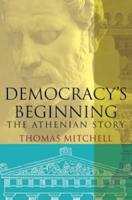
Yale (2015) h/b 350pp £25 (ISBN 9780300215038)
In this magisterial book, M. has set himself a huge task: to tell the history of Athenian democracy from its earliest beginnings down to its demise under Macedon in the late 4th century, and in so doing to uncover the nature of this democracy—what was ground-breaking and unique about it, the strengths which enabled it to survive and recover, and the weaknesses which undermined it, in the end fatally. He rightly sees it as vital to understand this story correctly, since it has been and still is a major influence on our views of what democracy should be.
This is a book for students of politics but also for historians. History is told in terms of the key events which shaped the democracy: the early rebellions against aristocratic corruption leading to Solon’s legal reforms, Cleisthenes’ reforms underpinning equality of involvement, the further reforms of Ephialtes and the Periclean heyday, the failures during the Peloponnesian War leading to defeat and the tyranny of the Thirty and the restoration of the democracy on a more secure legal footing. The important events are all there, with full reference to the sources. A historian would find this an excellent introduction before going into more detail, and a useful reference book to keep returning to. One especially useful feature is the chapter devoted to the fourth century. This is a period which, as M. says, is often ignored ‘because it lacks the dramatic highs and lows and colourful personalities and cultural breakthroughs of the fifth century’; yet the reforms of 403 BC, after the democracy was restored, placed it on a firmer legal base and ensured that ‘Athenian political life … had a new stability and maturity’.
M.’s main purpose is to unpick the elements that gave Athenian democracy its strength, as well as the flaws that weakened it. Citizens had equal rights, underpinned by law, and equal opportunities to exercise those rights; they were expected to take up their responsibilities when required and decide ‘for the common good’, and in so doing they became politically educated and loyal to a constitution in which they felt they had a stake. Executive officers were appointed by the citizens and their conduct scrutinised: those who failed such scrutiny would not be reappointed and could even be condemned to death. With these safeguards, there was no need to demand economic equality; citizens were free to appoint whoever could convince them that they were best for the job, even if, as was often the case, they were better educated and wealthier. The involvement of all in ‘the common good’ guarded against corruption and largely neutralised class envy.
But it could still go wrong, and when it did, the demos must accept the blame. After the death of Pericles in the plague, a vacuum formed which was filled either by demagogues (Cleon) or ‘young radicals’ (Alcibiades and friends, who had listened to the sophists and thought they had the right to be in charge). In both cases, they fed the citizen body’s self conceit: they could do as they liked, they should rule other Greek states, might was right. All the disastrous decisions to continue the war when Athens might have saved herself by an honourable peace were urged by these politicians but made by the demos. The fatal flaw was that the citizen body could easily succumb to the wrong sort of hubristic groupthink. And in the fourth century, in spite of the careful legal arrangements put in place to prevent factionalism ever re-emerging, Athens continued to take the wrong decisions about going to war for similar reasons, leading finally to defeat by Macedon and the stripping of the franchise.
In an epilogue, M. considers the lessons the Athenian experience may have for struggling democracies today; inevitably, he thinks mainly of America here. Interestingly, he does not see representative democracy as the problem; it is unavoidable in a big country, and modern inventions in communication could make it easier for citizens, or random samples of them, to engage directly in more discussions or policy. The main problem, for M., is the unrestrained opportunity for factionalism caused by the dependence of office-seekers on funding by special interests, so that the people seldom have an equal field to choose from. Also, there should be a better system of accountability for politicians. Political education for all the people, and a really free press, are the best antidotes to such evils.
The book is fully referenced and indexed, and attractively produced. Anyone seriously interested in politics, not just ancient historians, could usefully have it on their shelves.
Colin McDonald
